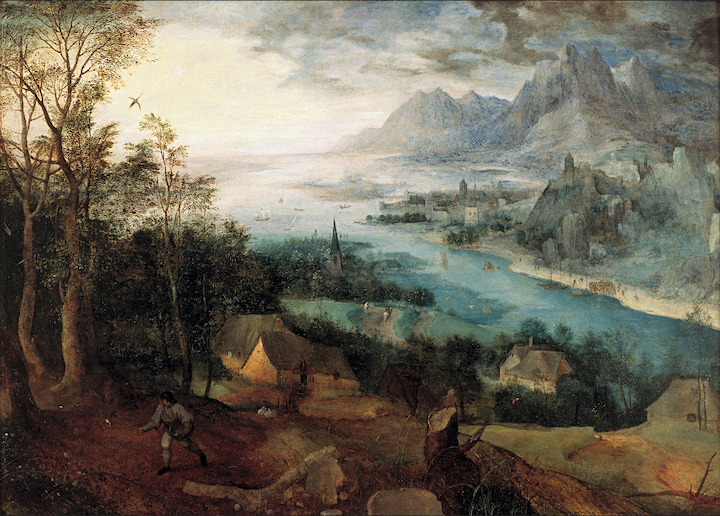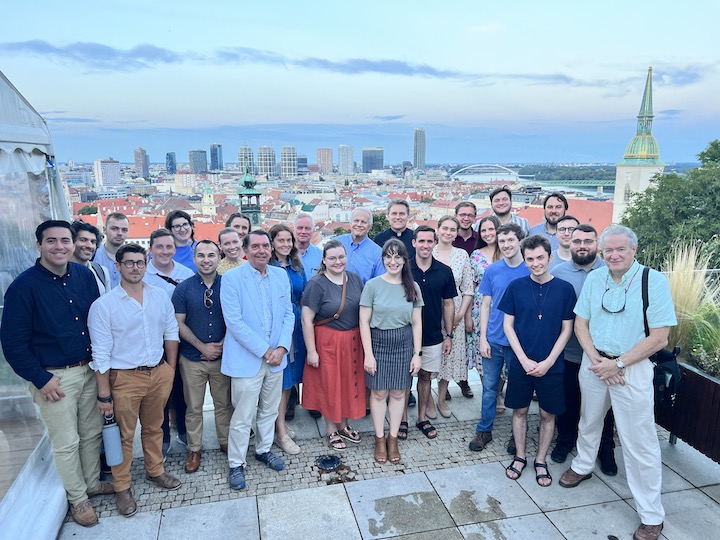This week tens of thousands of young people will gather in Lisbon on the Western edge of Europe for World Youth Day (WYD). Despite the controversies over whether this WYD is intended to evangelize or to be a merely neutral, synodal-like “walking together,” it’s a safe bet that the result will be, as in the past, a significant encounter with Jesus and his Church.
Also this week, about two dozen Christian faculty and students – drawn from Europe, the UK, North and South America – are meeting on the Eastern edge of Europe, in fact on the border with war-torn Ukraine, for the twenty-first annual Summer Seminar on the Free Society (FSS) in the Slovak Republic.
The scheduling conflict was not intentional, and isn‘t meant to undercut the better angels of WYD. But we’re meeting, as we have for over two decades, to dive deep into Catholic social doctrine and to consider how its principles, with their long roots in the best secular and religious thought and experience, might enable us to live a more authentically human — which is to say a fully Christian – life, in spite of looming obstacles and threats.
The FSS was the brainchild of Michael Novak, the great Slovak-American social thinker (and one of the founders of The Catholic Thing). When we started, the goal was to help peoples like the Slovaks and others who had been subjugated, and had their Christian values distorted, by communism. We now have around 500 alumni of the program spread all over Europe, the Americas, and as far away as the Philippines who are working in government (even the EU!), education, media, business, and other sectors – patiently planting seeds of a different and better future.
This may appear too gradualist an approach to various crises that, at times, seem to call for strong populist and other radical measures. But as I like to remind students, faculty, and anyone who will listen, no one knew that the Soviet Union was going to fall when it did. Not the CIA, MI6, the brainy analysts at prestigious universities and think tanks. No one. But a few figures – notably St. John Paul II, Ronald Reagan, Margaret Thatcher – knew that the struggle was ultimately human and moral. The Soviet Russia that collapsed still had its nukes, tons of advanced weapons, a vast army, a KGB spy network skilled in penetrating adversaries and repressing its own people. And yet moral arguments – backed by military readiness to be sure – overcame them.
Much has changed since then and our seminar discussions have evolved as well. But much has not changed. I’ve been particularly struck how, this year, a perennial question has returned, if not in quite the same terms that it had during the Cold War.

To put it simply, we face a question that has plagued our civilization since at least the Enlightenment and in several ways since as far back as the Protestant Reformation: Can authentic freedom, human flourishing, and a tolerable social order exist without God?
I’ve been impressed with how aware our participants are – mostly graduate students, young professionals, even an active-duty U.S. Army officer – of the deep roots of the problem. Our politicians, media, and academy largely scoff at the idea as simplistic, but it’s simply true that without God – and a God who is a Creator and has put logos, a rational order, into the very fabric of the world he created – why not engage in the various forms of social madness we see around us?
We often hear people these days speak of even the most fundamental human values as having been “socially constructed,” which is to say they were created by people in the past and can be re-created in different ways by us today. It’s actually rather logical – really almost inevitable – to look at everything that way once you take nature’s God out of the equation.
It’s almost impossible to ignore that fact in terms of questions like the “trans” craze. It’s less apparent in how various other social institutions have been demolished, beginning with the family but also the Church and even our secular institutions, though it’s easier to see the cumulative effects. Many believe that the destruction of past principles and limits leads to radical human freedom and, therefore, satisfaction. Almost no sane person would claim this exists today. Instead, people feel radically uprooted, without guides – other than their shifting feelings – as to how to live their lives. They often speak about how they don’t recognize their own countries anymore. And they’re not happy.
One of the texts the students are reading this year is Carl Trueman’s Strange New World: How Thinkers and Activists Redefined Identity and Sparked the Sexual Revolution, which is about much more than even the ambitious title says. For instance, it begins:
Many of us are familiar with books and movies whose plots revolve around central characters finding themselves trapped in a world where nothing behaves in quite the way they expect. Perhaps Lewis Carroll’s Alice in Wonderland and Alice Through the Looking-Glass might be the classic examples of this in children’s literature. But this is a standard plotline in many other works. From Franz Kafka’s The Trial to The Matrix series of movies, dystopian confusion is a hardy perennial of our culture. Yet this phenomenon is no longer confined to the fictional products of our day. For many people, the Western world in which we now live has a profoundly confusing, and often disturbing, quality to it.
Here in Central and Eastern Europe, that disorienting phenomenon has not reached the heights it has in most developed countries. And several nations, including the Czech Republic, Poland, and Hungary, are striving to make sure it never does. Which is why we stay at the task of discussing such questions in this part of the world – the peripheries from which some saner winds may blow towards our more Westerly, more bewildered peoples.

__________















